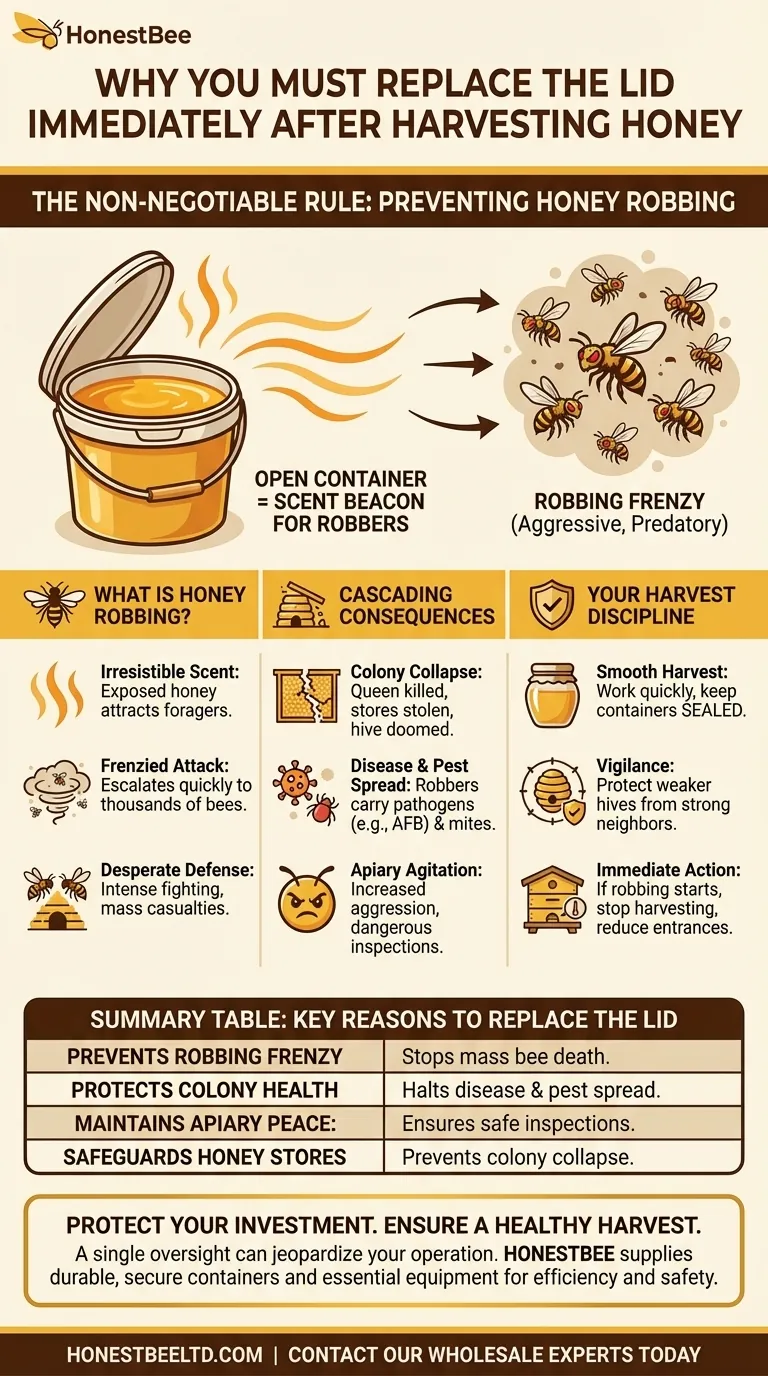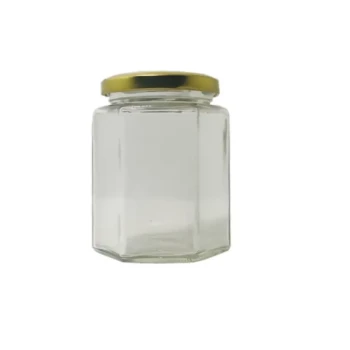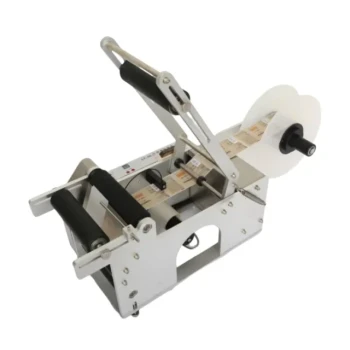Replacing the lid on your honey container immediately after harvesting is a non-negotiable rule of beekeeping. This single action is your primary defense against triggering "honey robbing," a destructive event where bees from other colonies attack a hive to steal its stores, which can quickly lead to chaos and colony death in your apiary.
The immediate concern is not the small amount of honey you might lose to a few opportunistic bees. The true danger is initiating a robbing frenzy—an aggressive, self-reinforcing attack that can overwhelm a colony's defenses, leading to mass bee death, the spread of disease, and the potential collapse of the targeted hive.

What is Honey Robbing?
Honey robbing is fundamentally different from normal foraging. It is an aggressive, predatory behavior triggered when bees discover an easy, undefended source of nectar or honey, such as an open container or a weak, struggling hive.
The Scent of Opportunity
The rich aroma of exposed honey is an irresistible signal to foraging bees. A single forager that discovers this prize will return to its own hive and perform an excited "dance," recruiting a large number of its sisters to the location.
From Foraging to Frenzy
Unlike foraging for nectar in flowers, which is a calm process, robbing is frantic and aggressive. The initial robbers quickly create a feedback loop, with more and more bees joining the assault. This can escalate from a few bees to a cloud of thousands in a matter of minutes.
A Hive's Desperate Defense
Guard bees from the targeted colony will fight to the death to protect their home and its vital food stores. A robbing event results in intense fighting at the hive entrance, leading to a large number of dead and dying bees from both the robbing and defending colonies.
The Cascading Consequences of a Robbing Event
Allowing robbing to start, even accidentally by leaving a honey lid off, can have devastating and long-lasting effects that extend far beyond a single afternoon.
Mass Casualties and Colony Collapse
A strong robbing attack will almost always overwhelm a weaker colony. The robbers will kill the defending bees, enter the hive, kill the queen, and steal all the honey stores. A hive without a queen or food is doomed and will collapse completely.
The Spread of Disease and Pests
This is one of the most significant and overlooked dangers. Robbing bees can pick up diseases (like American Foulbrood) and pests (like Varroa mites) from a weak, collapsing hive. They then carry these pathogens and parasites back to their own healthy colony, spreading infection throughout your entire apiary and even to neighboring beekeepers' hives.
A Shift in Apiary Temperament
Once a robbing frenzy has begun, the bees in the apiary can remain agitated, aggressive, and defensive for days or even weeks. This makes subsequent hive inspections more difficult and increases the likelihood of stings for the beekeeper.
Making the Right Choice for Your Goal
Your approach to harvesting must be guided by a constant awareness of robbing prevention. A few moments of carelessness can undo an entire season of work.
- If your primary focus is a smooth, safe harvest: Work quickly, keep all containers and honey-covered equipment sealed or covered at all times, and consider harvesting during times of low bee activity, such as early morning or late evening.
- If you are managing hives of varying strengths: Be especially vigilant. A strong hive can easily begin robbing a weaker neighbor, so your discipline in covering honey protects the most vulnerable colonies in your apiary.
- If you notice robbing has started: Act immediately. Stop all harvesting, cover any exposed honey, and reduce the entrance of the hive being attacked to a single bee's width to help its guards defend it more effectively.
Proper harvest discipline is the cornerstone of maintaining a peaceful, healthy, and productive apiary.
Summary Table:
| Key Reason | Consequence of Not Replacing Lid |
|---|---|
| Prevents Robbing Frenzy | Aggressive attacks from other colonies, leading to mass bee death. |
| Protects Colony Health | Spread of diseases like American Foulbrood and pests like Varroa mites. |
| Maintains Apiary Peace | Agitated, defensive bees making hive inspections difficult and dangerous. |
| Safeguards Honey Stores | Complete loss of a colony's vital food reserves, causing collapse. |
Protect Your Investment and Ensure a Healthy Harvest
A single oversight during harvest can jeopardize your entire operation. HONESTBEE understands the critical needs of commercial apiaries and beekeeping equipment distributors. We supply durable, secure containers and essential harvesting equipment designed for efficiency and safety.
Let us help you build a more resilient and productive apiary. Contact our wholesale experts today to discuss your equipment needs and protect your colonies.
Visual Guide

Related Products
- Hexagonal Glass Honey Jars with Metal Lug Caps Elegant Versatile Packaging
- Food Grade Plastic Honey Bucket Pail for Beekeeping
- Plastic Honey Gate Spout with Wing Nut for Beekeeping Honey Bucket
- Stainless Steel Beekeeping Honey Extractor Lid
- Inverted Squeezable Honey Jar with No Drip Flip Top Cap for Easy Pouring
People Also Ask
- Why use food-grade plastic or professional storage buckets for honey? Protect Quality and Prevent Fermentation
- How should large quantities of honey be stored to prevent premature granulation? Expert Bulk Honey Preservation Tips
- How do industrial-grade honey drums ensure product quality? Secure International Storage and Transport Solutions
- What is the importance of large-capacity industrial plastic containers? Secure Your Bulk Honey Supply Chain
- Why is it necessary to use airtight plastic containers for honey samples? Protect Purity and Analytical Accuracy
- Why is it necessary to use airtight containers for honey storage? Prevent Fermentation and Preserve Quality
- Why is the use of food-grade industrial storage tanks necessary? Protect Your Commercial Honey Quality
- Why are industrial-grade airtight containers necessary for honey pollen analysis? Preserve Sample Integrity Now



















